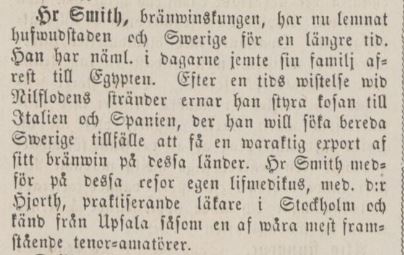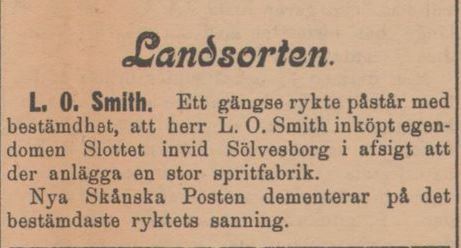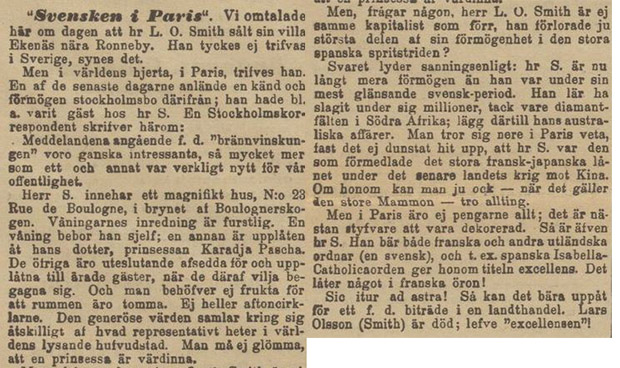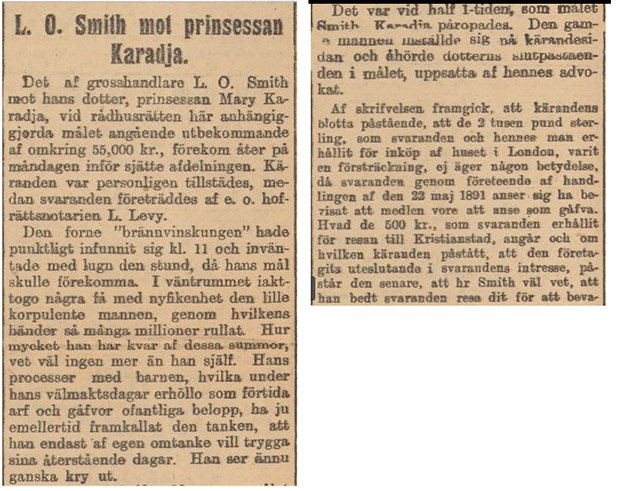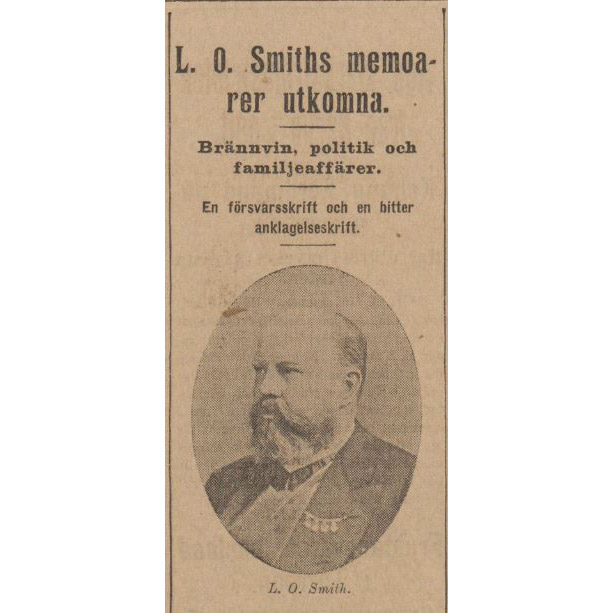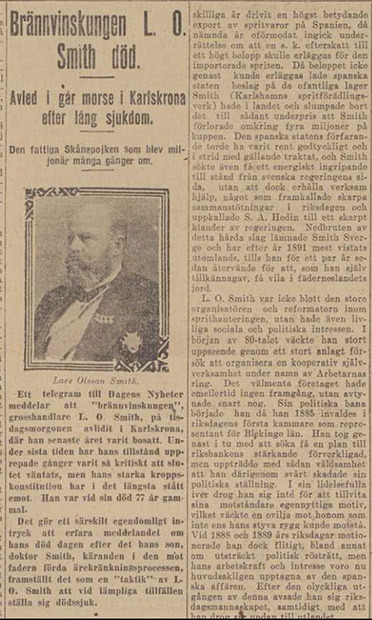
L.O. Smith in the press
The Swedish press loved the successful, feisty business man L.O. Smith. He was not scared to cause a stir – even when his opinions opposed the authorities. In addition, his family situation was anything but harmonious. Knowing that any publicity is better than no publicity, he often used the press to spread the news of his projects.
The vodka king travels to Egypt – brings a doctor!
There is no doubt that L.O. Smith was considered an important and successful person. Weekly magazines like Hvad Nytt (“What’s new”) even reported that he took the family on holiday to Egypt in November 1880. After spending some time on the beaches along the River Nile, the magazine reported that the Smith family planned to go to Italy and Spain to prepare his intended export of Swedish liquor. In retrospect, we know that this initiative didn’t turn out well. It ended with lengthy legal proceedings with the Spanish state. Smith was accompanied on the journey by Doctor Hjorth, a physician who had made himself a name as one of Uppsala’s foremost tenor amateurs.
L.O. Smith unwell in London
Throughout his life, Smith had health problems and was bedridden from time to time. He had a range of conditions, including gout, heart problems and something he called “spiritual shivers”. The fact that the newspaper Hallandsposten found it newsworthy to report that Smith was unwell in London is an indication of how famous he was in Sweden. It is not clear what he suffered from this time, but we do know that he recovered and returned to Sweden.
Absolut cleanliness in Karlshamn
The people of Gothenburg, Sweden’s second biggest city, are known for having a special sense of humor that goes way back in history. In 1885, a short post in the local paper Göteborgs Posten reported that L.O. Smith would take over Karlshamn’s garbage collection. As one of Karlshamn’s biggest employers, Smith was very influential. Therefore it was not surprising that he would manage the local collection of garbage. Now the city would be 10 times cleaner than before, Göteborgs Posten wrote, referring of course to Smith’s production method of purifying his vodka tenfold. Absolut cleanliness, in other words.
The vodka war in Madrid
In the late 19th century, L.O. Smith ended up in a difficult dispute with the Spanish state. Known as the vodka war, the disagreement concerned tax on imported spirits. According to the news item below, from the Göteborgs Weckoblad paper in 1892, the vodka king lived in Madrid during the conflict. He probably wanted to be close to his vodka stock, which had been seized by the Spanish state.
Has L.O. Smith bought Sölvesborg’s castle?
The king of vodka was surrounded by several myths. Here is one example from the newspaper Trollhättans tidning in 1896. According to a rumor, Smith was going to buy Sölvesborg’s castle with the intention of opening a liquor factory there. The rumor was denied by another newspaper, Nya Skånska Posten, although it is perfectly possible that Smith may have had such plans.
A former shop assistant in a general store may indeed rise above! Lars Olsson (Smith) is dead, long live “his excellency”!
L.O. Smith’s luxury villa in Paris
As a bit of a globetrotter, L.O. Smith often traveled around and even settled in other parts of the world. This article from Göteborgs Aftonblad says that he must have sold his villa in Ronneby, as he did not seem to like it in Sweden. Instead, he is supposed to have bought what is described almost as a palace next to the Boulogner forest. Here Smith had his own apartment while his daughter, Princess Karadja, lived on another floor. The rest of the lavishly furnished house was used for prominent guests. The article author describes Smith as a person with a growing fortune, richly decorated with badges of Swedish and foreign orders. It is easy to understand the dramatic words at the end of the article: ”A former shop assistant in a general store may indeed rise above! Lars Olsson (Smith) is dead, long live ‘his excellency’!”
She wasted money on spiritual madness
Smith took his own daughter to court
In his old age, L.O. Smith ended up in a family feud. Smith said that his daughter, Princess Karadja, owed him a considerable sum of money and took the case to court. The Swedish press followed the court case closely. The newspaper Stockholmstidningen quoted a letter that Smith submitted to the court: ”Mr Smith explained that it is with regret he had to take the matter to court. She (his daughter) had, in spite of his kindness and sacrifices, behaved disrespectfully towards her father. She had wasted money on spiritual madness, while he had to turn to the legal justice system to have something to live on. ‘All my children live in luxury’ is one statement he made on the subject.”
Smith’s memoirs
On October 9, 1913, the king of vodka published his memoirs. The book had the subheading ”Liquor, politics and family business”. The next day, the newspaper Svenska Dagbladet described it as ”A defense pamphlet and a bitter accusation.” In the preface, Smith wrote that the book was primarily ”A defense pamphlet intended to spread the light of truth on a situation that has been exposed to malicious accusations and obvious misunderstandings, to a greater extent than any other Swedish man has endured.” Of course the memoirs also deal with the poor boy from Skåne who became the vodka king of Sweden, but it is the accusations, aimed primarily at Smith’s children, his daughters Lucie Lagerbielke and Princess Karadja, that occupy the author. This is how he finishes the book: “In this way, I end the dispute with my ungrateful children. Their deeds will judge themselves, and we must all be accountable for our actions.”
L.O. Smith’s final moments
Only two months after he published his memoirs, L.O. Smith passed away following a period of illness in Karlskrona. Smith had suffered from various ailments most of his life, but the cause of his death was pneumonia. The newspaper Dagens Nyheter published an obituary, describing Smith as ”The poor boy from Skåne who became a multimillionaire”. A few days before Smith died, his son made a statement that made the journalist at Dagens Nyheter shudder. Smith and his son had had an ongoing dispute, and his son claimed that his father had often pretended to be ill to escape responsibility.
The poor boy from Skåne who became a multimillionaire.
